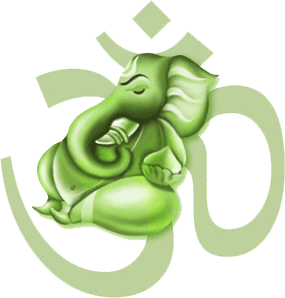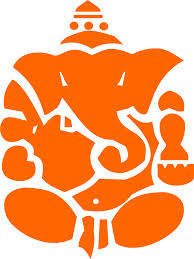Ganesha Story
To Download vinayaka chavithi vratha kalpam - pooja and katha in Telugu. Click here to Download.

Who is Ganesha: Ganesh is arguably one of the most beloved and worshiped Hindu deity of all. Being the eldest son of Lord Shiva; the Destroyer, and his wife Parvati, Ganesh is the God of Wisdom and destroyer of vanity, selfishness, pride and also the remover of obstacles. Before any undertaking is begun, a prayer to Ganesh is said to ensure success.
Birth of Ganesha:The Hinduism sacred texts give a variety of stories narrating the sequence of Ganesha's birth, the most popular being the one mentioning that Ganesha was created by Goddess Parvathi as a guardian to her privacy as depicted in the ancient Hindu text called the "Shiva Purana" which says
Parvathi while bathing rubbed off the sandalwood paste on her body and out of it created the figure of a young boy. She infused life into the figure and told him he was her son and should guard the entrance while she bathed.
Meanwhile Shiva came to see Parvathi but the young boy blocked his way and would not let him in. Shiva, unaware that this was his son, struck off the boys head in rage. Parvathi, returning from her bath, saw her headless son threatened in her rage to destroy the heavens and the earth, so great was her sorrow.

Shiva pacified her and instructed his ganas to bring the head of the first living and north facing being they encounter. They found a sleeping elephant and brought back its severed head, which was then attached to the body of the boy and breathed life into him.
Shiva has given the name Ganesha to his son and made him the leader of his ganas, hence his name “Ganapati”. Shiva also bestowed a boon that people would worship him and invoke his name before undertaking any venture. Shiva further blessed the boy, decreeing that all shall pray to Ganesh before enlisting any undertaking.
Significance of Ganesha's form:Ganesha is usually depicted either as a pictograph or as an idol with the body of a man and the head of an elephant, with four arms and having only one tusk, the other tusk appearing broken. On his waist, is his sacred thread, often in the form of a snake. The vehicle of Ganesha is the mouse, often seen paying obeisance to his lord. In essence Ganesha is the personification of material universe in all its various magnificent manifestations and symbol of abundance.
- -The head of Ganesh represents the Atma (the soul or ultimate reality), while his body signifies the world and earthly realm of human beings.
- -His fan-like ears convey that he is all ears to our petitions
- -The elephant trunk had the symbol of OM on it, which is the primal sound and symbol of the Universal reality.
- -In three of his hands he holds various objects that are symbolic tools for enlightenment: a pasam or rope, goad or axe, and a bowl of rice of or a sweet dessert ball.
- ➢The pasam or rope has three braids, each braid representing a different cautionary lesson: arrogance, Maya or the illusionary nature of the world, and ignorance.
- ➢The goad is a staff used to herd elephants and reminds the devotee to steer clear of a self-defeating path, while the axe represents the ability to cut unhealthy attachment to the material world.
- ➢The rice or sweet dessert represents the reward, or the sweetness of living in enlightenment, and the fullness of wisdom. It promises happiness in return for devotion.
- ➢Ganesh's fourth hand is always free, palm extended in a blessing.
- -The snake that runs round his waist represents energy in all forms and also remind us Ganesha is Shiva's son.
- -Ganesha's vehicle is a mouse, representing not only how much importance a wise man gives to the tiniest of creatures, but also agility and resourcefulness.
108 Names of Ganesha and their meanings:
•Akhuratha: One whose chariot is pulled by a mouse
•Alampata: One who is forever eternal
•Amit: One who is incomparable
•Anantachidrupamayam: One who is the personification of the infinite consciousness
•Avaneesh: Master of the universe
•Avighna: The remover of obstacles
•Balaganapati: Beloved child
•Bhalchandra: One who is moon crested
•Bheema: One who is gigantic
•Bhupati: The lord of lords
•Bhuvanpati: The lord of the heaven
•Buddhinath: The God of wisdom
•Buddhipriya: One who bestows of knowledge and intellect
•Buddhividhata: The God of knowledge
•Chaturbhuj: The four-armed lord
•Devadeva: The lord of lords
•Devantakanashakarin: Destroyer of evils and demons
•Devavrata: One who accepts all penances
•Devendrashika: The protector of all gods
•Dharmik: One who is righteous and charitable
•Dhoomravarna: One whose skin is smoke-hued
•Durja: The invincible
•Dvaimatura: One who has two mothers
•Ekaakshara: One who is of a single syllable
•Ekadanta: Single-tusked
•Ekadrishta: Single-focused
•Eshanputra: The son of Shiva
•Gadadhara: One whose weapon is the mace
•Gajakarna: One who has elephantine-ears
•Gajanana: One who has an elephantine face
•Gajananeti: One who has the looks of an elephant
•Gajavakra: The trunk of an elephant
•Gajavaktra: One who has an elephantine mouth
•Ganadhakshya: The lord of lords
•Ganadhyakshina: Leader of all celestial bodies
•Ganapati: The lord of lords
•Gaurisuta: The son of Gauri
•Gunina: The lord of virtues
•Haridra: One who is golden-hued
•Heramba: Mother's beloved son
•Kapila: One who is yellowish-brown
•Kaveesha: The lord of poets
•Kirti: The lord of music
•Kripalu: Merciful lord
•Krishapingaksha: One who has yellowish-brown eyes
•Kshamakaram: The abode of forgiveness
•Kshipra: One who is easy to appease
•Lambakarna: One who has large ears
•Lambodara: One who has a big belly
•Mahabala: One who is enormously strong
•Mahaganapati: The Supreme Lord
•Maheshwaram: Lord of the universe
•Mangalamurti: The all auspicious Lord
•Manomay: The winner of hearts
•Mrityuanjaya: The conqueror of death
•Mundakarama: The abode of happiness
•Muktidaya: Bestower of eternal bliss
•Musikvahana: One who rides a mouse
•Nadapratithishta: One who appreciates music
•Namasthetu: Destroyer of evils and sins
•Nandana: Lord Shiva's son
•Nideeshwaram: Bestower of wealth
•OBirminghamara: One who has the form of 'Om'
•Pitambara: One who has yellowish skin
•Pramoda: Lord of all abodes
•Prathameshwara: First among all Gods
•Purush: The omnipotent personality
•Rakta: One who is blood-hued
•Rudrapriya: One who is the beloved of Shiva
•Sarvadevatman: One who accepts all celestial offerings
•Sarvasiddhanta: Bestower of skills and knowledge
•Sarvatman: Protector of the universe
•Shambhavi: Son of Parvati
•Shashivarnam: One who has a moon-like complexion
•Shoorpakarna: One who is large-eared
•Shuban: The all auspicious Lord
•Shubhagunakanan One who is The Master of All Virtues
•Shweta: One who is as pure as the white
•Siddhidhata: Bestower of accomplishments and successes
•Siddhipriya: Giver of wishes and boons
•Siddhivinayaka: Bestower of success
•Skandapurvaja: Elder of Skanda or Kartikya
•Sumukha: One who has an auspicious face
•Sureshwaram: The lord of lords
•Swaroop: Lover of beauty
•Tarun: One who is ageless
•Uddanda: The nemesis of evils and vices
•Umaputra: The son of Goddess Uma
•Vakratunda: One with a curved trunk
•Varaganapati: Bestower of boons
•Varaprada: One who grants wishes
•Varadavinayaka: Bestower of success
•Veeraganapati: The vigorous lord
•Vidyavaridhi: The God of wisdom
•Vighnahara: Remover of obstacles
•Vignaharta: Destroyer of all obstacles
•Vighnaraja: Lord of all obstacles
•Vighnarajendra: Lord of all obstacles
•Vighnavinashanaya: Destroyer of all obstacles
•Vigneshwara: Lord of all obstacles
•Vikat: One who is huge
•Vinayaka: The Supreme Lord
•Vishwamukha: Master of the universe
•Vishwaraja: King of the world
•Yagnakaya: One who accepts sacrificial offerings
•Yashaskaram: The bestower of fame and fortune
•Yashvasin: The beloved and ever popular lord
•Yogadhipa: The lord of meditation